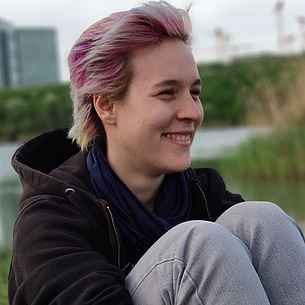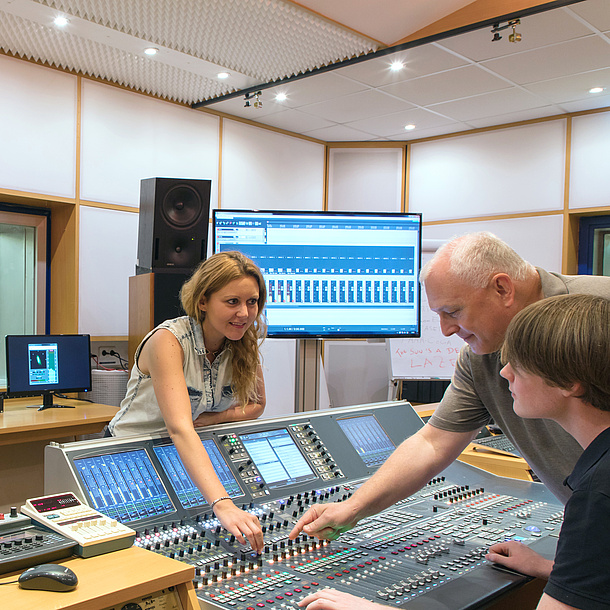- Duration of study: 4 semesters
- ECTS credit points: 120
- Academic degree: "Diplom-Ingenieurin" or "Diplom-Ingenieur" ("Dipl.Ing." or "DI"), equivalent to the Master of Science (MSc)
- Language of instruction: German
The Master's Programme
The Master's degree programme in Electrical Engineering and Audio Engineering bridges the gap between technology and art. Early on in your studies, you complete compulsory subjects in the fields of electrical engineering and information technology, as well as in acoustics and computer music. Along the way, you become familiar with control engineering and adaptive systems. You will also gain specialized knowledge of technical acoustics, immersive 3D audio technology and computer music, among other things.
From the first semester and on, you choose one out of four areas to specialize in and broaden your knowledge by taking lectures and completing exercises in the other three specialization areas. Some of the courses are held in English in order to give you the possibility to pursue an international career.
In the 4th semester, you will write your master's thesis – usually on a subject with practical application – in your chosen area of specialization.
Excellent infrastructure is available to you during your studies. These include the Sound Lab and the recording studio of the Signal Processing and Speech Communication Laboratory (SPSC) at TU Graz as well as the production studio and the CUBE, a playback room for 3D sound at the Institute of Electronic Music and Acoustics (IEM) at the University of Music and Performing Arts Graz.
By taking part in numerous laboratory exercises during your studies, you will deepen your theoretical knowledge and have the opportunity to discuss questions that arising during the practical application of this knowledge. Thanks to the fact that the number of students is limited, you will benefit from individual supervision.
Innovative research projects, such as those in the areas of 3D audio reproduction and room acoustic design, are integrated directly in the courses. The further development of the electrolarynx – a medical device that serves as a speech aid for people without a larynx – also makes an important contribution to society.
You can choose from among the following areas of specialization:
- Embedded Audio - includes subject areas such as circuitry and electronics, computer engineering and communications engineering.
- Acoustics and Recording Technology - includes acoustics subject areas such as psychoacoustics and vehicle acoustics, as well as recording and playback technology.
- Signal Processing and Speech Communication – places a focus on subject areas such as digital signals, digital speech processing and audio signal processing.
- Computer Music and Multimedia – covers subject areas that range from classical music theory to algorithmic composition and multimedia art.

The degree programme in Electrical Engineering and Audio Engineering is a unique, inter-university combination of technology and music, which offers a multifaceted foundation for a diversified professional field. The enthusiasm for my field of study has carried me through all my studies and encouraged me to get involved in professional associations like the AES and in the students’ high-voltage drawing room.
After completing several internships at companies that specialised in the fields of loudspeaker construction, signal processing and voice communication and graduating with my degree, I joined the Acoustics Research Institute at the Austrian Academy of Sciences in Vienna.
The Master's degree programme in Electrical Engineering and Audio Engineering is an inter-university programme offered jointly by TU Graz and the University of Music and Performing Arts Graz.
You can select one of the two universities as your home university and attend courses at both universities.
Student representation for the Electrical Engineering and Audio Engineering programme is found at both universities; these representatives provide support if you have questions about the programme.
Admission
Students who have graduated from the Bachelor's Degree Programme in Electrical Engineering and Audio Engineering at TU Graz or the University of Music and Performing Arts Graz (KUG) are admitted without needing to fulfil any further conditions.
Graduates of other bachelor’s degree programmes are invited to the admission colloquium.
- Admission and deadlines for Austrian students who are beginning their studies at TU Graz for the first time
- Admission and deadlines for international students
- If you are or were already admitted to a degree programme at TU Graz, please come to the TU Graz Registrar’s Office in person during the admission period or contact study@tugraz.at.
Please submit the transcript of records of your bachelor’s degree and certificates demonstrating your existing level of musical/artistic education to the KUG Registration Office by 30 June.
After that you will be invited to an interview in which we will decide what supplementary courses you may need to take, and whether you have to sit the entrance examination in September.
Contact study@tugraz.at
Career Prospects
As a graduate of the master's degree programme, you can take advantage of an impressive range of career opportunities. Wherever new media technology meets art, electrical engineering audio engineers can be found in the business world:
- as developers of studio, live-recording and hi-fi equipment.
- as acousticians in the automotive industry, noise abatement, room acoustics, the design of measurement applications and psychoacoustic test series, industrial sound design and the development of hearing aids.
- as signal processing specialists for communication technologies, speech and audio processing algorithms.
- in the field of multimedia sound design and music production, as broadcast and sound engineers or in the development of audio applications.
Acquire AI skills: AIE Extension Programme
Increase your career prospects with the Artificial Intelligence Engineering (AIE) extension programme and learn essential skills in AI development and application during or after completing your Master's degree.



